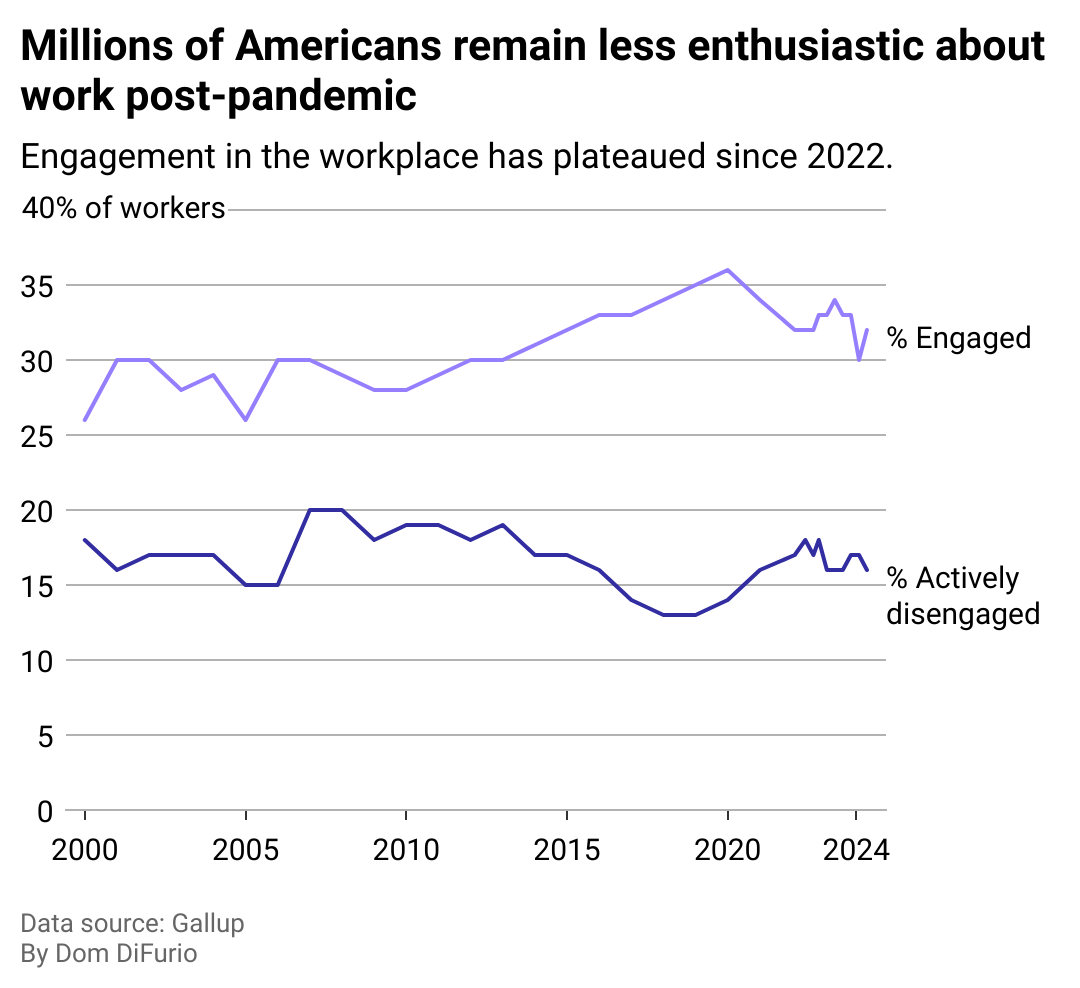Wind: mph,
Welcome to our new web site!
To give our readers a chance to experience all that our new website has to offer, we have made all content freely avaiable, through October 1, 2018.
During this time, print and digital subscribers will not need to log in to view our stories or e-editions.

Americans remain detached from their work significantly, leading to a lack of motivation that has profoundly impacted retention, productivity, and profitability.
For every employee who feels invested in their company's mission and operations, nearly two more are disengaged—whether abstaining from group collaboration or expressing a negative attitude toward their work.
That's according to Gallup's annual survey on employee engagement, which revealed companies are still struggling to engage workers on a deeper level. Actively disengaged employees rose to 17% in the first quarter of 2024, up from 16% the full year prior.
This follows a trend that began during the COVID-19 pandemic in 2022, despite a slight uptick in engagement in 2023, according to the long-running survey.
The 2024 survey of nearly 19,000 Americans working both full- and part-time jobs touched on numerous factors contributing to engagement, including workplace satisfaction, a sense of mission and purpose, and praise and recognition. Disengagement is particularly strong among Gen Z workers and younger millennials; it was also more pronounced among fully in-person workers, who feel their work could be done remotely but aren't permitted to work that way, results revealed.
Workplace engagement is multifaceted and includes both an employee's investment in their workplace's success and a sense of clarity about how their specific role can help their organization thrive. Clear communication, strong leadership, and a commitment to professional development are critical to engagement, according to the Society for Human Resource Management.
Extensive research clarifies that engaged employees and optimal performance go hand in hand—and that's good for business. With that in mind, Wysa analyzed Gallup data to illustrate how employees are growing less engaged with their workplaces.

It's not wrong to trace the decline in employee engagement to a once-in-a-lifetime pandemic that upended every aspect of daily life—including work across industries. Employee engagement in the workplace rose throughout the 2010s, ultimately peaking in 2020. It fell between 2020 and 2022 and has hovered around nine-year lows.
To stem the spread of the virus, many employers quickly pivoted to offering fully remote and eventually hybrid work options.
Today, half of workers capable of working fully remote work in hybrid work environments, according to Gallup. Only 27% work exclusively remotely.
Most workers find hybrid work arrangements beneficial. However, miscommunication, feeling disconnected from their organizations, and difficulty being productive are all drawbacks some workers in hybrid work arrangements feel today, according to an April 2024 survey from workplace collaboration software provider Lucid Software.
"Employers are struggling," Jocelyn Dove, a talent acquisition manager and project management professional, told Stacker.
"You need that in-person type of experience. Working from home is not built for everybody," Dove told Stacker. "It's important for leaders to find touchpoints to meet their team, remind them of the culture, mission, and why they're there. [It's important for] enforcing certain rules and [making] sure people are complying."
But the rise of hybrid work isn't the only thing to blame for elevated disengagement in recent years. Other studies have shown a mismatch between employer and worker expectations is another contributing factor.
Gallup data showed that Gen Z workers and younger millennials born after 1989 lacked a sense of alignment with their organization's culture. Employees entering the workforce who haven't experienced in-person work may find it challenging to connect with coworkers and senior management.
Human resources consultant Victoria Yang spoke to Stacker about how poor employee engagement can stem from systemic issues. Workers can become disengaged if companies don't have "environments that people want to work in," said Yang, whose work with companies like Google, Looker, and Bonusly has, at times, focused on employee engagement.
For younger workers who missed out on pivotal in-person moments like high school or college graduation, starting a first job without a traditional in-person onboarding program may mitigate their ability to bond or develop professional social skills development before entering the workplace. Employers might find these workers pushing back on participating in workplace activities designed to boost engagement, Dove explained.
Simply put: "People still need people," Dove said.
Dove and Yang emphasized the importance of providing employees with a sense of purpose and understanding their place within the company values system to boost engagement. That's especially true for younger employees who "want to feel like they are working toward something that's positive," Dove said.
According to Yang, employee engagement boils down to three factors: learning opportunities, the potential for growth, and buy-in toward the company's mission.

Shifting company culture is no small task, but employers can start by focusing on whether or not employees identify with an organization, feel energized at work, and feel committed to their company's success, according to researchers at Harvard University and the University of California, Berkeley.
For instance, according to the researchers, Netflix has a high employee engagement rate thanks to a work culture that prioritizes responsibility and intrinsic motivation. The streaming giant's work environment encourages employees to make independent decisions without managerial oversight but with the company's best interest in mind. That gives employees freedom and a sense that they're really contributing to the overall goal.
"When you've given people more freedom, you can't take it back," Yang said.
Showing appreciation is another proven way to boost engagement. Employees give the gift of time to their jobs, and rewards that allow employees to "buy back" their time help them see the tangible value of their contributions. This includes discounts or credits for services like house cleaning, child care, and meal delivery, which create efficiencies in their personal lives.
Hybrid work is here to stay, and with it comes equity and flexibility. Obstacles to engagement will also persist, but employers committed to fostering connections can start by demonstrating understanding, offering training, and providing employees, particularly younger ones, much-needed structure. "Be more human," Dove said. "Be more flexible."
Story editing by Alizah Salario. Additional editing by Kelly Glass. Copy editing by Paris Close. Photo selection by Clarese Moller.
This story originally appeared on Wysa and was produced and distributed in partnership with Stacker Studio.